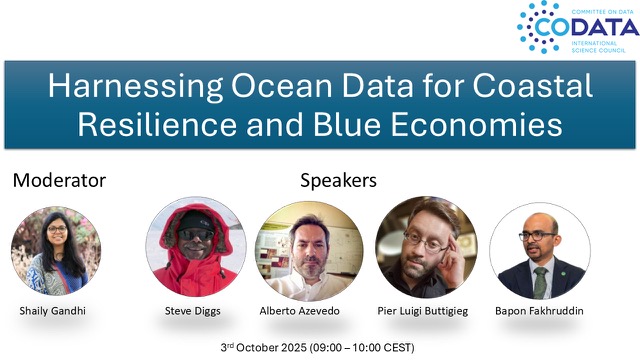Date: 3rd October 2025
Time: 9:00 am to 9:45 am (CET)
Register here: https://us02web.zoom.us/meeting/register/4XviYgkeQmu8XNGlxkijHQ
 Webinar Description:
Webinar Description:
Oceans are the planet’s largest climate regulator, a source of livelihood for billions, and home to rich biodiversity. Yet they are under increasing pressure from climate change, pollution, overfishing, and rising sea levels. In coastal and island regions, the vulnerability is especially acute, threatening communities, ecosystems, and the sustainability of blue economies.
This webinar will spotlight the transformative potential of open, FAIR, and integrated ocean data in building resilient coastal systems. From real-time marine observations and early warning systems to ecosystem modeling and ocean-based climate finance, effective data use is key to informing smart policy and sustainable development. The session will also address the importance of making ocean data more accessible and usable for coastal planners, communities, and the private sector.
Join us to explore how data can guide coastal adaptation, protect marine ecosystems, and unlock the potential of the blue economy in an era of climate uncertainty.
Moderator : Shaily Gandhi
Speakers:
Steve Diggs
Steve Diggs is a distinguished data professional with more than 30 years of experience in scientific data management, digital preservation, and the design and delivery of large-scale information systems. Currently, he serves as a Research Data Specialist and Senior Product Manager in the UC Curation Center (UC3) within the California Digital Library (CDL) under the UC Office of the President.
Bapon Fakhruddin, PhD : Water Sector Lead
Dr. Fakhruddin is a leading expert on climate resilience. He has over 23 years of experience advising governments and organizations around the world on disaster risk reduction and climate change adaptation. As a hydrometeorologist, his specialty is in climate risk assessment, early warning systems, community resilience, and water security.
Dr. Fakhruddin is currently leading the Water Sector at the Green Climate Fund. He oversees climate investments in vulnerable countries around the world to support water security and early warning project origination. He serves on international expert committees, Chair, Board Member and Professor such as the International Science Council, CODATA, Earth GEO, WMO, and lends his expertise to advance national resilience agendas for governments in LDCs and SIDS.
Alberto Azevedo
Dr. Alberto Azevedo is a Physical Oceanographer with a Ph.D. in Geophysics and GeoInformation, specializing in Oceanography. He is currently a researcher at the National Laboratory for Civil Engineering (LNEC) in Portugal. With more than 23 years of research experience, his work has focused on numerical modeling (hydrodynamics, oil spills, and internal ocean waves), remote sensing (applied to internal waves, oil spills, and waterbody detection using SAR and multispectral sensors), as well as high-performance and cloud computing, including the development of services for the European Open Science Cloud (EOSC).
He is the co-creator and developer of OPENCoastS, an on-demand hydrodynamic forecasting service for coastal and estuarine regions, and the coordinator and principal developer of WORSICA, a remote sensing platform for water detection in both coastal and inland areas.
Most recently, Dr. Azevedo has been leading LNEC’s activities in the Climate-Adapt4EOSC project, which develops new tools and services to support climate change adaptation strategies in coastal zones.
Pier Luigi Buttigieg
Pier Luigi Buttigieg is a principal investigator, digital architect, and data strategist, with a research background in marine microbial ecology and bioinformatics. Dr Buttigieg contributes to the steering, strategy, and operations of multiple regional and international research projects and infrastructures, including several Actions within the UN Decade of Ocean Science for Sustainable Development. Dr Buttigieg also chairs the Ocean Data and Information System (ODIS) Programme Component of the Intergovernmental Oceanographic Commission (IOC) of UNESCO, and is a member of the Global Ocean Observing System’s (GOOS) Biology and Ecosystems Panel. Over the past few years, Dr Buttigieg has been working to transfer learnings and capacity from ODIS and the nascent IOC Data Architecture to further CODATA’s Cross-domain Interoperability Framework (CDIF).
